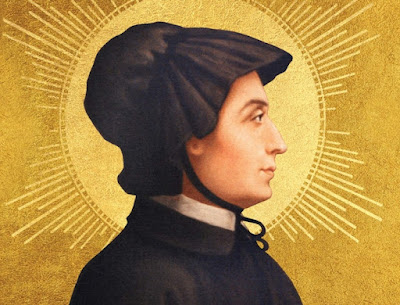Saint Elizabeth Ann Seton, born on August 28, 1774, in New York City, is a significant figure in the history of American Catholicism. Her life, characterized by profound faith, resilience, and a commitment to education and charity, continues to inspire countless individuals.
Elizabeth was born into a well-off Episcopalian family and received an education that was quite unusual for women of her era. At the age of 19, she married William Magee Seton, a successful businessman, and they had five children together. While her early life appeared to be blissful, it was soon challenged by adversity.
The family's fortunes took a downturn due to William's business failures and his deteriorating health. In 1803, in search of a remedy for his tuberculosis, they traveled to Italy. Tragically, William passed away shortly after their arrival, leaving Elizabeth a widow with young children in an unfamiliar land. During her time in Italy, she was deeply touched by the Catholic faith of her friends and the Filicchi family, which prompted her to explore Catholicism.
After returning to the United States, Elizabeth converted to Catholicism in 1805, a choice that strained her relationships with her remaining family and friends. Nevertheless, her unwavering faith prevailed. To provide for her children, she opened a school for girls in Baltimore in 1808, marking the start of her lifelong dedication to education.
In 1809, Elizabeth relocated to Emmitsburg, Maryland, where she established the Sisters of Charity of St. Joseph’s, the first congregation of religious sisters in the United States. The mission of this community focused on educating young girls and caring for orphans, laying the groundwork for the parochial school system in the country. Elizabeth’s innovative approach to education emphasized a blend of academic rigor and spiritual development, leading her schools to gain remarkable recognition.
Despite her impressive achievements, Elizabeth faced significant personal losses, including the deaths of two of her daughters, and she constantly battled financial hardships. Yet, her steadfast faith and commitment to her mission helped her navigate these challenges. Her writings, which include letters, journals, and spiritual reflections, showcase her deep spirituality and unwavering trust in God’s guidance.
Elizabeth Ann Seton passed away on January 4, 1821, at the young age of 46. Over time, her legacy flourished, and she was canonized as the first native-born American saint by Pope Paul VI on September 14, 1975. Today, she is honored as a patroness of Catholic schools and a symbol of charity and perseverance.
The life of Saint Elizabeth Ann Seton illuminates the transformative power of faith and the significant role of education and charity. Her unwavering commitment to serving others and her pioneering contributions to Catholic education have left an indelible mark on American Catholicism. Through her example, Saint Elizabeth Ann Seton encourages believers to lead lives filled with faith, compassion, and service, embodying the spirit of love and dedication that she embraced wholeheartedly.
Tags:
Saint Of The Day

